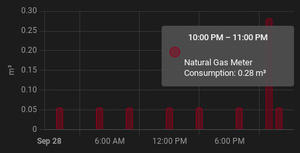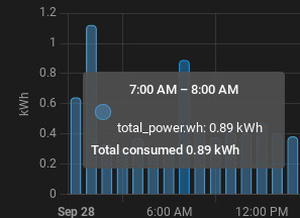8 cubic feet
This is the average amount of natural gas burned by my water heater to heat about 1 hot shower's worth of water. Yes, I am now able to monitor resource consumption at home. Watch out!
Sorry to the rest of the world who use the superior metric system, but units of gas are sold here in "therms", which is much easier to convert to feet³ than to meters³...

Anyways, I recently added a few improvements to my home to help monitor energy and water consumption. Thank you to the companies / municipalities that service my water and natural gas service for 1) installing wireless meters and 2) leaving them unencrypted (more on that in a bit!) For measuring electricity, I sprung for an IoTaWatt, with split-core current transformers installed in/under the breaker panel. The whole setup is "managed" by Home Assistant.
Monitoring the utility wireless meters for water and natural gas consumption was surprisingly easy with an SDR (I used one from rtl-sdr). I've heard that in other countries, the messages these wireless meters broadcast in every direction is encrypted. At my location, for whatever reasons (or lack thereof), they are not. So not only can I easily receive usage info about the meters measuring my service, but I'm able to receive messages from quite a few other meters located around my home... at neighbors' houses, across the street, whatever. This particular water meter includes some bits to indicate whether it detects a "leak condition", where water is being drained away without interruption for some large number of hours. While trying to identify my meter in the swarm of meters all shouting around me, I noticed that some neighbor has a water leak. I had no way to identify who they were, since (luckily) the meters aren't broadcasting any obvious personally identifiable info. The "leak" went away after another day, before I was able to call the water provider. If that was a legitimate water leak that lasted many days/weeks, it would be really useful info to know if you were the one with the leak.
I haven't had this level of sensing set up for very long, however I can't help but notice the real cost of doing certain things we do regularly. Boiling eggs on the stove takes about 0.5kWh of electricity, for example. 0.5kWh is about the amount of energy that 5 adult humans produce over 1 hour, assuming the Wikipedia estimate of 100 watts per adult. That may or may not sound like much, but it adds up. What I can't see (yet?) is what it took my electricity provider to generate 0.5kWh of electricity.
It's a little nuts to think about, and I'm not sure if this is going to heavily influence my/my family's behavior moving forward. I think it may... Because even after a small number of days it's really hard to ignore some usage patterns that are emerging. I also can't help but think if others would act differently if they could see a more accurate real cost of doing things.
